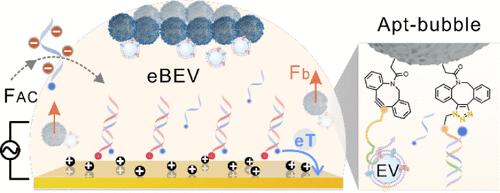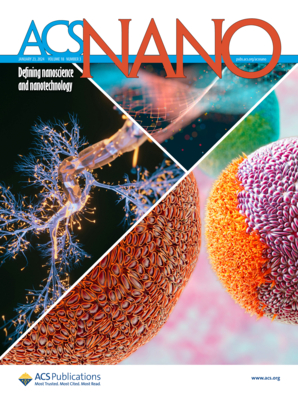Electric Field-Resistant Bubble-Enhanced Wash-Free Profiling of Extracellular Vesicle Surface Markers
IF 15.8
1区 材料科学
Q1 CHEMISTRY, MULTIDISCIPLINARY
引用次数: 0
Abstract
Efficient profiling of circulating extracellular vesicles (EVs) benefits noninvasive cancer diagnosis and therapeutic monitoring, but is technically hampered by tedious isolation, multistep washing, and poor sensitivity. Here, we report multifunctional bubbles that enable self-separation, wash-free, single-step, and ultrasensitive profiling of EV surface markers in plasma samples for early diagnosis and treatment monitoring of lung cancer. In this assay, the buoyancy-dominated bubble is electric field-resistant, allowing EV-responsive release of electroactive probes for electrohydrodynamic nanoshearing force-enhanced hybridization, self-separation from the electrode interface for minimizing noise in electrochemical measurements, and one-step wash-free EV profiling. This assay achieves sensitivity near a single-EV level, shows high specificity against nontarget EVs, and tracks EV phenotypic changes induced by drugs. We further show that this technology can classify plasma samples (n = 111) between cancer patients and noncancer controls with accuracies >95%, enable accurate early diagnosis via machine learning, and monitor pre/post-surgery efficacy with higher accuracy over routine clinical serum markers. This bubble-driven one-step EV assay provides a promising wash-free quantitative tool to enable clinical precision liquid biopsies.

求助全文
约1分钟内获得全文
求助全文
来源期刊

ACS Nano
工程技术-材料科学:综合
CiteScore
26.00
自引率
4.10%
发文量
1627
审稿时长
1.7 months
期刊介绍:
ACS Nano, published monthly, serves as an international forum for comprehensive articles on nanoscience and nanotechnology research at the intersections of chemistry, biology, materials science, physics, and engineering. The journal fosters communication among scientists in these communities, facilitating collaboration, new research opportunities, and advancements through discoveries. ACS Nano covers synthesis, assembly, characterization, theory, and simulation of nanostructures, nanobiotechnology, nanofabrication, methods and tools for nanoscience and nanotechnology, and self- and directed-assembly. Alongside original research articles, it offers thorough reviews, perspectives on cutting-edge research, and discussions envisioning the future of nanoscience and nanotechnology.
 求助内容:
求助内容: 应助结果提醒方式:
应助结果提醒方式:


